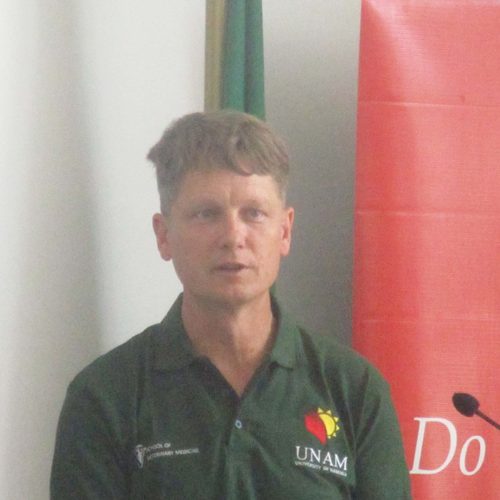By Kimmie Mikatazo & Mary Mashete

The University of Namibia’s School of Veterinary Medicine has launched an expanded Herd Health Programme in Katima Mulilo, on Tuesday to help local farmers fight livestock diseases, boost productivity, and improve animal health through preventive care and farmer training.
The School of Veterinary Medicine, under Associate Dean, Dr. Anna Marais, continues to grow its academic and community outreach by offering degrees and diplomas in veterinary science.
The school also runs key clinical facilities such as the Veterinary Academic Hospital, Mobile Animal Clinic, and Wildlife Clinical Studies Unit and extending veterinary services to remote areas.
Speaking during the launch, University of Namibia’s Vice Chancellor, Prof. Kenneth Matengu emphasized UNAM’s holistic approach to animal care, known as One Health, which connects the well-being of people, animals, and the environment. “Healthy herds mean healthy families and stronger communities,” he said, stressing the importance of collaborative efforts in building a disease-free livestock sector.
The new programme, spearheaded by Prof. Dietmar Holm, Specialist Veterinarian in Bovine Herd Health from the University of Pretoria in South Africa , focuses on prevention rather than treatment.
Through regular vaccinations, parasite control, and nutritional and reproductive monitoring, farmers can reduce animal losses and increase calving and weaning rates.
“Prevention is always cheaper than cure,” Prof. Holm noted, adding that consistent veterinary visits and tailored health plans are key to improving productivity.
At the Katima Mulilo Campus, UNAM is expanding its veterinary facilities, upgrading the current consulting room to a fully equipped clinic that will soon offer small animal, production, and wildlife services. Plans are also underway to introduce a Herd Health Service in 2026, supported by the Directorate of Veterinary Services.
Local farmers will receive hands-on training in disease detection, animal handling, and basic farm procedures such as branding and castration. They will also learn to identify toxic plants and practice artificial insemination to enhance breeding success.
Remote monitoring systems introduced under the programme have already shown positive results, with a 50% drop in livestock illness and 85% fewer animal deaths reported in early trials.
Through its Herd Health Programme, UNAM’s School of Veterinary Medicine is paving the way for a healthier and more productive livestock industry, which will combine science, community outreach, and practical farmer education.
The initiative promises a sustainable future for farmers in the Zambezi Region and across Namibia.
END…








Comments
You must log in to post a comment.